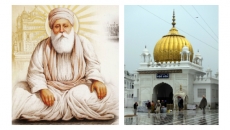Why is the shrine, situated a few kilometres from the border in the Narowal district, so significant that the Indian devotees have been demanding year-long pilgrimage facility for the last 70 years?
Kartarpur Sahib gurdwara in Pakistan’s Punjab Province is corridor to enable Indian pilgrims to visit it throughout the year. Why is the shrine, situated a few kilometres from the border in the Narowal district, so significant that the Indian devotees have been demanding year-long pilgrimage facility for the last 70 years?
The gurdwara, originally known as Gurdwara Darbar Sahib, is among the holiest of holy shrines which is believed to be the final resting place of Guru Nanak Dev, the founder of the Sikh religion. Located on the banks of Ravi River, the gurdwara was built to commemorate the site where Guru Nanak settled after his missionary work.
Gurdwara Darbar Sahib was the place where Guru Nanak is believed to have lived for 18 years until his death in 1539. After a lifetime of travel and converting the masses, Guru Nanak settled down in Kartarpur on his farm on the banks of the Ravi River, according to a post on the official website of the Shiromani Gurdwara Prabhandak Committee (SPGC), the body governing the affairs of the Sikh community.
Guru Nanak discarded the dress of a pilgrim and adopted the clothes of a householder. Days would be spent in farming while mornings and evenings would be spent in prayer and singing the praises of God.
Over centuries, the river Ravi shifted course and the part of the farm where Guru Nanak passed away in 1539 is on the other side of the river in Pakistan, while Gurdwara Dera Baba Nanak is on the Indian side of the border where Guru Nanak used to meditate daily. In the gurdwara is preserved a chola (robe) which Guru Nanak received as a gift while visiting Mecca, the SGPC added.
The founder of Sikhism was born on April 15, 1469, at Rai-Bhoi-di Talwandi in Pakistan’s Shekhupura district, now Nankana Sahib. The original structure of the Kartarpur Sahib was once destroyed by floods. It was reconstructed by Bhupinder Singh, the then scion of Patiala and grandfather of current Punjab Chief Minister Amarinder Singh.

The shrine was closed to people coming from across India’s border after the partition in 1947. The gurdwara was opened to pilgrims after repairs and restoration in 1999, and Sikh jathas have been visiting the shrine regularly ever since. A 500-year-old well, believed to have been built during the lifetime of Guru Nanak Dev, was discovered near the Kartarpur gurdwara in April. The well was discovered while digging the enclosure of the shrine.
Sikh ‘jathas’ from India travel to Pakistan on four occasions every year – Baisakhi, the martyrdom day of Guru Arjan Dev, the death anniversary of Maharaja Ranjit Singh, and the birthday of Guru Nanak Dev. Pakistani authorities normally clear the tall grass from time to time, enabling the devotees from India to view the shrine with the help of a telescope.
The Indian devotees, especially the Sikhs, had been demanding a visa-free “khule darshan” (free obeisance facility) at the gurdwara for all faiths, from India and overseas, all seven days a week by crossing the international border from Dera Baba Nanak town in Punjab’s Gurdaspur district.
Keeping in mind the huge sentiment of people of Punjab, India first proposed the Kartarpur Sahib corridor in 1999 when the then Prime Minister Atal Bihari Vajpayee took a bus ride to Lahore. However, it did not make much progress before last year when the proposal was renewed and given a push by India.
Pakistan agreed to the proposal and foundation stones were laid for the corridor on both sides of the border in November 2018. The construction of the corridor was completed in October, ahead of the 550th birth anniversary of Guru Nanak Dev. In November, the gurdwara was opened to Indian pilgrims.






